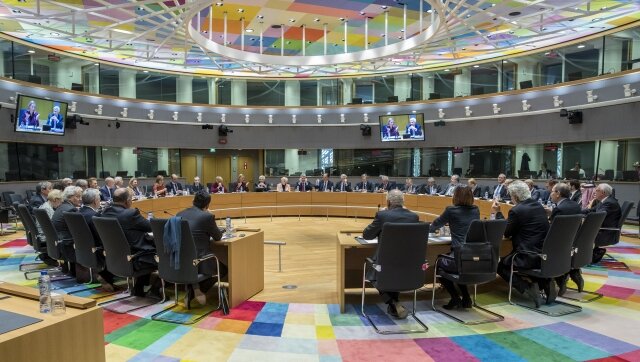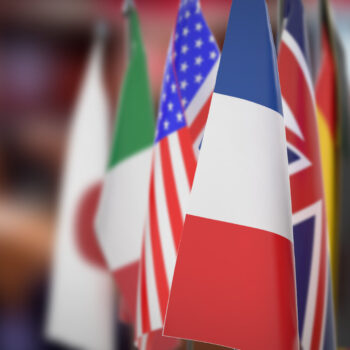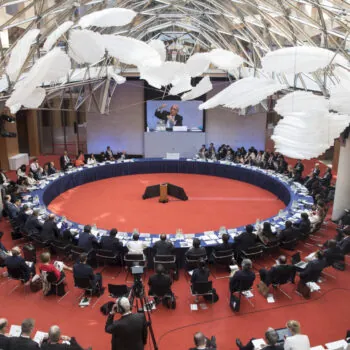Today, EU Foreign Affairs Ministers will adopt conclusions on Green Diplomacy. They set out the EU’s shared approach to influencing global climate action in 2024, following COP28 where the EU demonstrated its ability to leverage its leadership into global action.
The conclusions articulate the EU’s leadership on implementing climate and energy goals globally but are impeded by the lack of clarity on the timeline and ambition of the EU’s own contribution.
With a mandate in hand for its climate diplomacy this year, the EU must work proactively to build economic, financial and trade partnerships to support countries in raising their climate ambitions. The EU also needs to strengthen its own domestic action on climate, starting with setting a 1.5C aligned 2035 climate target by COP29.
EU Foreign Affairs Ministers will adopt Foreign Affairs Council (FAC) conclusions on EU green diplomacy on 18 March 2024. This will mark the first EU public statement following COP28, a crucial moment in shaping the world’s interpretation of the UAE consensus adopted in Dubai. The European contribution to the success of COP28 was significant, marking the end of the fossil fuel era, establishing a global agenda for a broader financial reform, and creating the Loss and Damage fund, instrumental in fostering trust between developed and developing countries.
In a politically charged election year and amidst crises in and around Europe, the EU needs to develop a strong vision for Europe in the world in its Strategic Agenda 2024-2029. The FAC provide impetus to the conversation at a crucial moment and offer guidance for the EU diplomatic priorities.
Today’s FAC conclusions set a mandate for the EU’s diplomatic pathway to COP30 in Belém in 2025, a major milestone for implementation of the Paris Agreement. By the end of this year, or early 2025 at the latest countries are expected to present their next Nationally Determined Contributions (NDC). The conclusions provide important guidance for the EU diplomatic priorities during this crucial two-year period for international climate action.
The conclusions set out areas of EU leadership, notably on the COP28 commitment to tripling global renewable energy capacity, doubling global rate of energy efficiency improvement and “transitioning away from fossil fuels”. The EU has committed itself and called for a fully or predominantly decarbonised global power system by the 2030s aligning its ambition with the G7 commitments. Furthermore, the EU has called for no new coal globally, to be achieved in cooperation with the Powering Past Coal Alliance. The EU backs raising finance to pay for the climate transition from the fossil fuel sector.
However, the Council’s approach to energy security remains one-sided and dominated by the fossil fuel supply security and diversification. There is a lack of systemic thinking regarding the role of demand reduction, energy systems resilience and strategic alliances or major consumer countries. While the conclusions indicate that the EU is beginning to consider shaping an equitable transition of its fossil fuel producing partners, a concrete action plan has yet to come.
The EU will also need to demonstrate its ambition and value as a partner by COP29 in Baku, by agreeing its 2035 Nationally Determined Contribution (NDC). It must develop a more comprehensive plan for how the EU will deploy the wide range of levers at its disposal – from trade, economic and financial diplomacy – to build equal (equitable?) climate-centred partnerships. These partnerships should incentivise developing countries to enhance their ambition levels. Finally, the EU should transition from its current stance on the new climate finance goal.
Quotes
Pieter de Pous, Programme Lead, E3G said:
“The EU is aligning itself with its G7 peers by aiming for fossil free power in the 2030s and working to stop the development of new coal infrastructure everywhere. However, it missed an opportunity to lead by example and articulate the pace at which it expects to phase out both coal and gas in the power sector.”
Tom Evans, Senior Policy Advisor, E3G, said:
“The EU is right to ramp up the pressure on countries to come forward with ambitious new climate plans in the next 12 months. But the EU has not yet fully committed to leading this global effort by announcing its own 2035 climate target this year. This is undermining the EU’s leadership on climate action.”
Ana Mulio Alvarez, Researcher, E3G said:
“The EU missed the opportunity of being a global leader and first mover in risk and resilience. It remains unclear what the EU’s role will be in delivering COP28 mandates such as the development and implementations of NAPs, the new Loss and Damage Fund, and the Global Goal on Adaptation Framework. Internally, the EU must update and expand its Adaptation Strategy and integrate resilience priorities into its NDC. Externally, the EU should demonstrate global solidarity and play a bridging role in currently polarized negotiations.”
Manon Dufour, Director, E3G Brussels said:
“Green diplomacy can boost the EU’s geoeconomic resilience, enhance its competitiveness in the clean economy, and strengthen its relationship with key emerging economies. EU leaders must substantiate the promising framework laid out by Foreign Affairs Ministers. This entails defining strategic clean transition partnerships and confirming European domestic ambition in the next European agenda.”
Maria Pastukhova, Programme Lead, Energy Diplomacy said:
“While the EU continues to send clear signals supporting the global energy transition targets, it fails to communicate its own contribution to global progress. The EU would be more impactful if it defined its role in driving this global transition, particularly with regard to its fossil fuel producing partners, the emerging markets and developing economies, and reset its approach to energy security. Something the new European Commission must pick up as a matter of priority.”
– ENDS –
Available for comment
Pieter de Pous (EN, NL, DE), Programme Lead, Fossil Fuel Transition
m: +49 160 6573414 pieter.depous@e3g.org
Tom Evans (EN), Senior Policy Advisor, COP29
m: +44 7931 317 327 tom.evans@e3g.org
Ana Mulio Alvarez (EN, ES), Researcher, Adaptation and Loss and Damage,
m: +34639916760 ana.mulio@e3g.org
Maria Pastukhova (EN, DE, JP, RU) Programme Lead, Energy Diplomacy,
m: +49 16090167735 maria.pastukhova@e3g.org
Notes to Editors
- E3G is an independent climate change think tank with a global outlook. We work on the frontier of the climate landscape, tackling the barriers and advancing the solutions to a safe climate. Our goal is to translate climate politics, economics and policies into action. About – E3G
- For further enquiries email press@e3g.org or phone +44 (0)7783 787 863
- E3G’s and Strategic Perspectives’ developed recommendations for climate and energy diplomacy in this short briefing. E3G sketched how clean energy partnerships with Brazil, Indonesia, and Egypt could look like.


